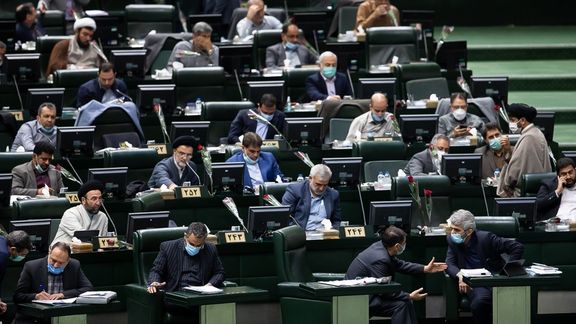Iranian Parliament Upbeat On Nuclear Talks

Iran’s parliament met Wednesday to hear from Foreign Minister Hossein Amir-Abdollahian and lead negotiator Ali Bagheri Kani on the nuclear talks.

Iran’s parliament met Wednesday to hear from Foreign Minister Hossein Amir-Abdollahian and lead negotiator Ali Bagheri Kani on the nuclear talks.
Two years after hardliner-majority parliament, against the advice of then President Hassan Rouhani, passed legislation expanding the nuclear program and reducing cooperation with the International Atomic Energy Agency, there was general support for Iranian negotiators.
The official news agency quoted leading deputy Vali Esmaili that the parliament, convened in closed session, had no need to approve any terms agreed over restoring the 2015 Iran nuclear deal, the JCPOA (Joint Comprehensive Plan of Acton). “Full authority,” had been given to the negotiating team led by Bagheri Kani, said Esmaili.
Claiming victory on Wednesday Abolfazl Amuee, spokesman of the parliament’s foreign policy and security committee, said “the other side” had “accepted the Islamic Republic’s arguments on verification of lifting of sanctions and providing guarantees, and the essence of our country’s nuclear capabilities will be preserved.”
The Supreme National Security Council met Monday to approve Iran’s written response, given later that day, to a European Union text circulated August 8 as EU mediator Enrique Mora tried to conclude 16-months of talks between Iran and world powers aimed at reviving the JCPOA. The United States left the deal in 2018 and limits Iran began exceeding its nuclear limits in 2019.
SNSC secretary Ali Shamkhani appeared in parliament alongside Amir-Abdollahian and Bagheri Kani. He told parliament what had been achieved in the talks was built on the parliamentary legislation of 2020.
Esmaili urged the US and “the west” to “give the right answer to the package proposed by Iran.” A positive, if cautious response from the EU to the Iranian text, has encouraged hopes over JCPOA revival.
Steps to agreement ‘underway’
Vahid Jalalzadeh, head of parliament’s National Security Commission, said Iran was ready to agree once its interests were met, while Abbas Moghtadaei, another deputy, said steps towards agreement were “underway and negotiations have ended.”
The Iranian parliament approved the JCPOA back in 2015, despite the opposition of many members. While the number of deputies opposing, or critical of, the agreement has increased since then, the united front presented by Amir-Abdollahian and Bagheri Kani, both appointed by President Ebrahim Raisi, and the SNSC endorsement have shifted the mood.
Oil prices dropped Tuesday and Wednesday, partly as traders detected a more positive tone around the nuclear talks, which could release hundreds of thousands of barrels a day of Iranian oil from storage onto world markets. Under its ‘maximum pressure’ sanctions since 2018, the US has curbed Iran’s oil exports by threatening punitive action against buyers.
Positive assessment
With diplomats refusing to reveal details of the August 8 EU text or of the Iranian response, reports have offered differing explanations of what remains at issue. Iranian media and Mohammad Marandi, spokesman for the Iranian negotiators, said Tuesday that Tehran was still seeking guarantees it would be cushioned – both in terms of its economy and nuclear program – against any future US decision to again leave the agreement.
Defending the approach of the Biden administration Tuesday, State Department Spokesman Ned Price referred to “complex issues.” With vocal opposition in the US Congress to the JCPOA unabated, 250 Iranian activist outside Iran called Tuesday for breaking off diplomat contacts with Iran as a “terrorist-Islamic regime.”